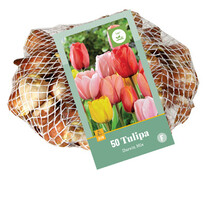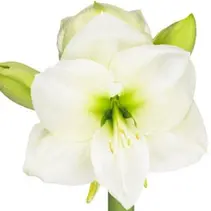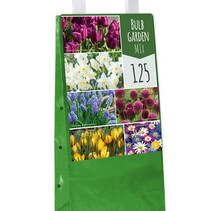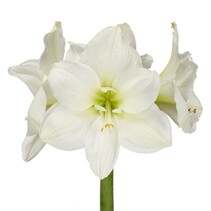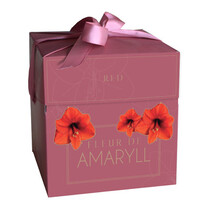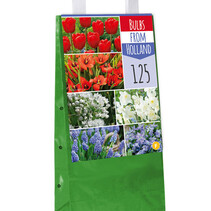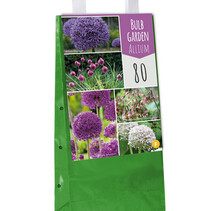Jub Holland
- Delivery costs depending on the country
- Snelle Levering (per product vermeld)
- Gratis bezorging vanaf 60 euro
1910 - 1947 (1ST GENERATION)
On 17 March 1910, Jacob Uittenbogaard started his own farming business on farm "Kweeklust" in Oegstgeest. By changing the meadow into land for bulb and vegetable cultivation, it became a mixed farm with livestock and vegetables as well as bulb cultivation. In 1920, Jacob switched to forcing tulips.
Jacob had four sons and a daughter. The sons, Bram, Jan, Ruud and Jaap joined the business and increasingly focused on bulb cultivation. This was reinforced when Jan moved to Noordwijkerhout in 1943 to set up a flower bulb nursery, where he grew a varied stand of tulips and daffodils. Ruud continued to work on the farm in Oegstgeest and was a specialist in forcing tulips. Jaap set up the company's trading arm in addition to his work in the nursery. Besides domestic gardeners, he also focused on exports to England. The bulbs from Noordwijkerhout were brought to Oegstgeest to be prepared for trade.
1947 - 1976 (2ND GENERATION)
When Jan, Ruud and Jaap joined the company in 1947, the firm's name became "Jac. Uittenbogaard & Zonen". In 1952, the (polder) land in Noordwijkerhout was sprayed, giving the company excellent bulb land and increasing production. Land was bought in the following years and in the mid-fifties a new barn and greenhouse with cells were built in Noordwijkerhout.
The company in Oegstgeest was expropriated in 1971 due to the expansion of the municipality of Leiden, and the entire company moved to Robijnslaan 23 in Noordwijkerhout. Ruud and Jaap also moved to Noordwijkerhout with their families. This was also the period when the cultivation of vegetables was completely stopped and the cultivation of hyacinths was taken up.
1976 - 1996 (3RD GENERATION)
In 1976, Jaap, son of Jan, and Jacob, son of Ruud, became co-shareholders and the firm became a private limited company (B.V.). In the years that followed, the nursery and forcing grew and the domestic trade was expanded to offer flower bulbs in consumer packaging. Because of this growth, a new barn greenhouse and daffodil shed were added in 1978.
Rudolph, son of Ruud, joined the company in 1981 and Frank, also son of Ruud, in 1985. When Jaap (2nd generation), son of Jacob, died suddenly on in 1986, Jaap (3rd generation) continued and expanded his trading activities, including the forcing trade to England. His work in the nursery came under pressure and was then completely taken over by Rudolph. The shares from Jaap's estate were transferred to Jaap, Jacob, Rudolph and Frank in 1988, making Rudolph and Frank also shareholders in the company. In the 1980s, the nursery and (export) trade continued to expand, for which a new barn with cold store was built in 1990. Surrounding plots of land were also bought. The nursery had grown to 40 hectares and 3 million already scalded cut flowers.
Further growth in trade was achieved in the 1990s by attracting representatives to various countries in Europe and acquisitions of both packaged trade and landscaping and municipal trade. The working space became too small, so a new barn greenhouse was built in 1995 to serve both the packaged trade and horticulture.
1996 - PRESENT (4TH GENERATION)
Jaap-Jan and Robbert, sons of Jaap, joined the company in 1996 and 1997 respectively. Over the years, Jaap-Jan focused on the presentation, sales and organisation of consumer packaging to retail and garden centre organisations and Robbert on the horticultural, park, and municipal trade. They mainly focused on Europe, but trade was also set up to Canada and the United States. Jaap-Jan and Robbert became co-shareholders of the company in 2000.
The trade continued to grow and at that time several barns in the bulb-growing region were rented to process the bulbs. Because of the spatial plans of the Noordwijkerhout local council, the old sheds had to disappear and, at the end of 2006, the construction of new business premises on a nearby plot at Robijnslaan 43 could be started.
The building was completed in 2008 and offered new opportunities for further expansion of the trade. In 2010, the company celebrated its 100th anniversary and received the designation "purveyor to the royal household". From then on, the management team consisted of Frank, Jaap-Jan and Robbert. Jaap and Rudolph continued to work, but the daily management of the company was transferred. In that year, they also stopped growing hyacinths and the nursery became mainly used for trade and forcing.
In 2011, a new greenhouse was built and forcing grew to 4 million tulips per season. In 2013, Dolph, Rudolph's son, joined the company who became responsible for financial affairs. The management decided to further concentrate on the Retail and Landscape business in Europe. In 2016, Dolph became a co-shareholder and joined the management board. In 2017, the company won 31st edition of the Horticulture Entrepreneur Award and was allowed to call itself an ambassador of the horticulture sector for a year.
CARE FOR THE ENVIRONMENT
We are proud of our new environmental certificate PlanetProof (eco-label), which was created in cooperation with various environmental organisations. With this, JUB is taking a pioneering role within the sector.
Our company is MPS-A and NL-Greenlabel certified and was one of the first companies to be PlanetProof certified. PlanetProof complies with 'Environmental criteria for the socially responsible procurement of green spaces', as published by PIANOo. With PlanetProof, governments have a wide choice when purchasing sustainable flower bulbs.
Our flower bulbs make a very important contribution to biodiversity and, in the barren and sparse early spring months, a great refresher. Flowering flower bulbs are highly appreciated by the public because of their 'pop up' experience in spring and by now we also know that greenery contributes to social cohesion, health and general wellbeing. As a green space manager, you can therefore give your projects a huge boost by using lots of (naturalising) flower bulbs.
ORGANIC FLOWER BULBS & BIODIVERSITY
Besides sustainably grown flower bulbs, JUB also supplies organic bulbs under SKAL, an independent organisation that supervises organic production. The successful cooperation with the NBV (Dutch Beekeepers Association) and the Butterfly Foundation has resulted in an extensive range of bulb mixtures attractive to bees and butterflies.
More colour and biodiversity in green spaces are two items of several municipalities' green policies. That is why municipalities are planting more and more flower bulbs and why every spring these hundreds of thousands of bulbs colour roadsides, parks and gardens. Nature in the city or village is an important concern. By planting butterfly- and bee-attracting bulb mixtures, bees and butterflies can provide pollination for many plants. They are thus an important link in nature development and nature experience.






